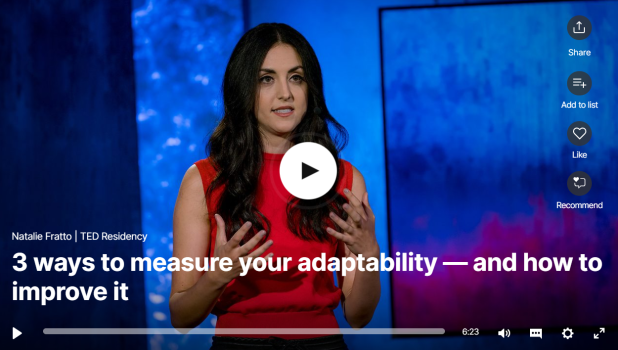
Mullenweg, the co-founder of Wordpress, gives us a look into the future (or what we thought would be the future) and makes some great points on why working from home is good for business. He also points out why he doesn’t use the word “remote”, choosing to call his team a distributed workforce.
Mullenweg explains that using the word “remote”, implies that some people are essential and some aren’t. He uses the word distributed to describe what they do because everyone is on equal playing fields. He also outlines several tips on how to successfully manage a distributed workforce.

Adaptability is how well a person reacts to change. In this TED Talk, venture investor Natalie Fratto explains how she believes adaptability itself is a muscle that needs to be exercised.
She uses the following method to measure “adaptability quotient” and determine whether or not she should invest in a new company. We think these are very valuable prompts you can go through while adapting to the current stay-at-home work policies:
-
Ask what if questions: This forces the brain to simulate and form a vision. For example, what if I need to work from home for the next 2 months? This will get you starting to think how you can best prepare for that scenario.
-
Look for signs of unlearning: Working from home may not come easily to you, but that doesn’t mean it’s something you can’t get used to. Fratto explains adaptability is not fixed, and if you make the effort to unlearn things, your adaptability will grow.
-
Look for ways to infuse exploration into your work and life: There is a natural tension between exploitation and exploration. Oftentimes, when you get used to doing something that works for you, you try to exploit that method. Instead, you should focus on exploring new ways to get something done. If you adapt this type of thinking, you’ll be surprised at the new things you’ll be able to excel at.
Adaptability is a muscle that needs to be exercised, so don’t be hard on yourself if you’re having trouble adapting to working from home. Things take time.

When someone asks you, “where do you go when you really need to get something done”? Chances are, you’ve rarely said “the office” before. So how can you use that to your advantage?
Jason Fried, co-founder of 37signals the company responsible for Basecamp and other web-based collaboration tools, likens sleep to work in the sense that you need uninterrupted stretches of time to get good sleep the same way you need uninterrupted stretches of time to get good work done. Very few people have these stretches of uninterruption at the office.
Working from home provides you a new opportunity to have better control of your work environment, where you can work without the distractions that pull you away from your work.

Ingrid Fetell Lee designer and writer defines joy as feeling good in the moment.
In her TedTalk, she states, “Though the feeling of joy is mysterious and elusive, we can access it through tangible and physical attributes, or what designers call aesthetics.” You can use the resources around you to lead happier and healthier lives, especially at home, if you know where joy hides and how to find it.
Chances are, your new home office space could be feeling a bit cluttered or perhaps a bit dull.
Joy is an intangible feeling, so how can the intangible things next to your computer make you feel intangible joy? Joy begins with the senses therefore surrounding yourself with round and symmetrical shapes and pops of bright color and multiples can make your new home office space more joyful.

Have you ever heard of the happiness advantage? “Your brain is 31% more productive than your brain at negative, neutral or stressed.”
Shawn Anchor the CEO of Good Think Inc. delivers an enlightening speech with a few good laughs, that can help give you a more positive mentality about work as the world adapts to COVID-19.
Anchor says, “90 percent of your long-term happiness is predicted not by the external world, but by the way your brain processes the world.” Changing the way you think about your external situation will have a huge impact on your day-to-day life.
Not only can this type of thinking positively impact your daily life, it can also change the way you work. “75% of job success is predicted by your optimism levels, your social support, and your ability to see stress as a challenge instead of as a threat.”
If you're looking for a new opportunity to take the next step in your career, apply to any of our open positions at CyberCoders.com.

















